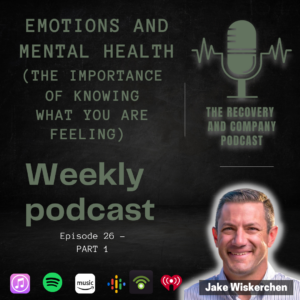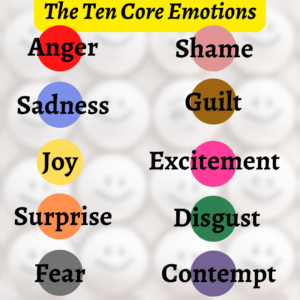When we think of recovery it is easy to focus on things like removing the substance or only treating the issues surrounding the addiction. While this is important, emotional wellness plays a big role in our recovery as well. Most of us would agree that difficult emotions or poor coping skills can trigger a relapse. If we have been avoiding troubling feelings for a long time, sometimes it is easier to continue the pattern. If there is a history of treating emotions like anger or sadness with substances, we can reach a point in life when turning to the substance becomes automatic. Then we become so dis-connected with our emotions that we have trouble identifying what we are feeling.
When we practice unhealthy emotions for a long time, we start to identify with them.
According to marriage and family therapist Jake Wiskershen who recently joined us on The Recovery and Company Podcast Emotional Wellness Series,  when we practice unhealthy emotions for a long time, we start to identify with them. We may continue defending a negative feeling that was useful in the past but is not anymore. He says challenging unhealthy things can be terrifying because we must dissolve something we know very well and investigate something we do not know which is our infinite potential. Sometimes it is easier to cling to what we know.
when we practice unhealthy emotions for a long time, we start to identify with them. We may continue defending a negative feeling that was useful in the past but is not anymore. He says challenging unhealthy things can be terrifying because we must dissolve something we know very well and investigate something we do not know which is our infinite potential. Sometimes it is easier to cling to what we know.
How do we re-connect with ourselves emotionally?
Using an addictive substance as an emotional coping mechanism is usually a person’s honest attempt to solve a problem. Unfortunately, it tends to create more problems and becomes maladaptive as addiction progresses. If we have been disconnected from our emotions for years or even decades, it can take time to re-connect. In a sense, it is like re-connecting with ourselves; or in some instances, connecting with our authentic self for the first time.
The great news is that with practice it is possible! There are many tools available. I asked Jake to share his personal favorite.  He said once you know what the ten core emotions are (photo on the right), you practice observing the emotion and then describing what you are feeling: “this technique takes your reactivity out of the emotion and allows you to simply notice this thing that is happening. Notice what it is, now analyze it. What is it? Are you angry the steak was overcooked or are you just disappointed and can you sit in that disappointment? Then…tolerate it. With toleration comes validation. You’re like “‘oh this is real, I’m really sad.’” The next step is what am I going to do about it? If anger is your thing, figure out what is beneath it.”
He said once you know what the ten core emotions are (photo on the right), you practice observing the emotion and then describing what you are feeling: “this technique takes your reactivity out of the emotion and allows you to simply notice this thing that is happening. Notice what it is, now analyze it. What is it? Are you angry the steak was overcooked or are you just disappointed and can you sit in that disappointment? Then…tolerate it. With toleration comes validation. You’re like “‘oh this is real, I’m really sad.’” The next step is what am I going to do about it? If anger is your thing, figure out what is beneath it.”
I tried this technique and found it extremely helpful. A few years back I resigned from a thirty-year radio career. Not only was that career high profile, it was very defining. You could say my identity was wrapped up in that position.  After my resignation I went through a time of deep sadness where I felt suicidal. For the first time I stepped away from myself and observed what I was feeling. I also allowed myself to feel that sadness through to completeness rather than bail out of the hurt or replace it with something else. What happened was quite exceptional. Once I allowed myself to ‘go there,’ the pain subsided and eventually disappeared. I am not suggesting it is always this easy. Sometimes we need counseling and even psychotherapy if there is deep trauma. However, when we can sit through difficult emotions and allow ourselves to ‘get to the other side’ so to speak, we train ourselves that we can deal with our difficult emotions.
After my resignation I went through a time of deep sadness where I felt suicidal. For the first time I stepped away from myself and observed what I was feeling. I also allowed myself to feel that sadness through to completeness rather than bail out of the hurt or replace it with something else. What happened was quite exceptional. Once I allowed myself to ‘go there,’ the pain subsided and eventually disappeared. I am not suggesting it is always this easy. Sometimes we need counseling and even psychotherapy if there is deep trauma. However, when we can sit through difficult emotions and allow ourselves to ‘get to the other side’ so to speak, we train ourselves that we can deal with our difficult emotions.
According to Jake “this ‘wave riding’ is important because it teaches the brain that you have been there before and you can do it again. If you do not practice that, it teaches the brain the opposite which says ‘I can’t go here, I don’t know what will happen.’ Then the emotional experiences appear to be bottomless -and they are not- so you just avoid emotion all the time. You cannot just avoid one emotion. When you shut one down you shut them all down.”
What can happen if we do not validate our emotions?
According to Jake, avoiding our emotions can make us sick: “in the limbic system you have got a bunch of glands that do different things. They produce things like cortisol, adrenaline, dopamine, norepinephrine, epinephrine, serotonin, etc.  When you get validated emotionally and someone says “you are sad and it is ok to be sad, and there are reasons for you to be sad,” what that does is it drains the limbic system and allows those chemicals to process through the body at a cellular level such that they get excreted properly. If we do not do that, if we do not get validated…or self-validate and say ‘yea this is real,’ those chemicals stick and they cause cellular destruction. This is how we end up with a lot of our mystery ailments.”
When you get validated emotionally and someone says “you are sad and it is ok to be sad, and there are reasons for you to be sad,” what that does is it drains the limbic system and allows those chemicals to process through the body at a cellular level such that they get excreted properly. If we do not do that, if we do not get validated…or self-validate and say ‘yea this is real,’ those chemicals stick and they cause cellular destruction. This is how we end up with a lot of our mystery ailments.”
Validating our emotions is another way of validating who we are as human beings. Developing this type of authenticity around our emotions not only heals our minds, but it can heal our bodies too!
